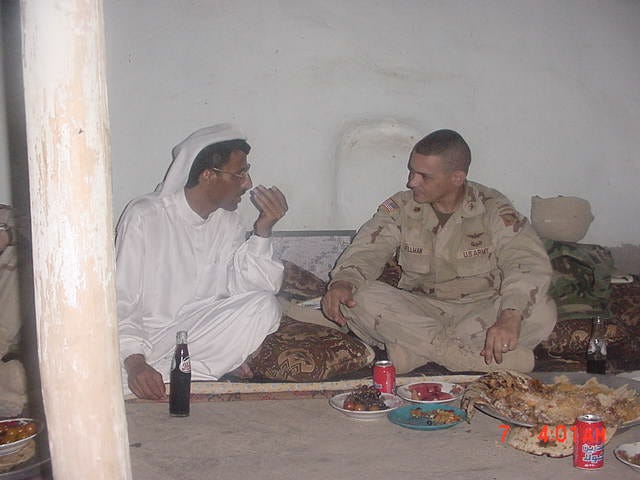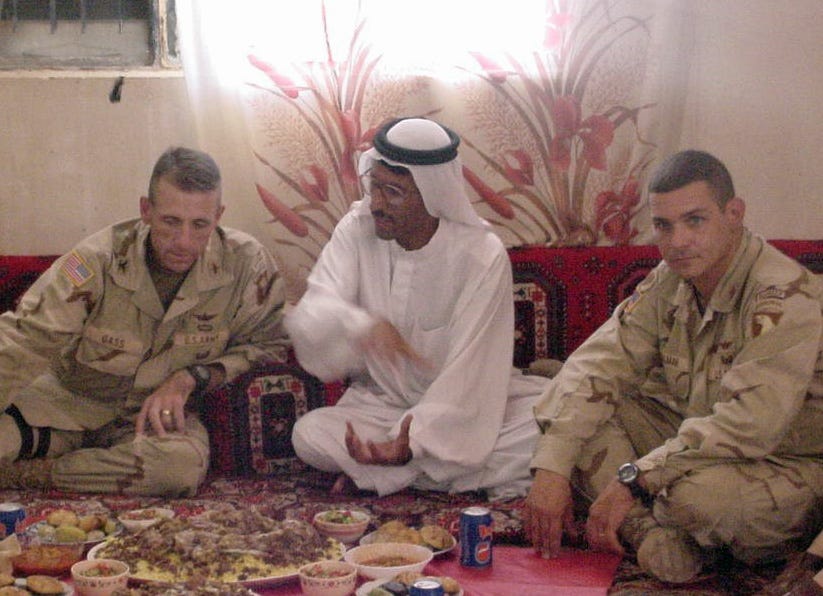Sunday Read: Trust is earned
The time I took a calculated risk on trust that I've never regretted
Thinking about trust
I have been thinking about trust a lot lately. So often in life we place our trust in people only to have it destroyed for the most ridiculous reasons. Money. Power. Fame. It’s remarkable what people will do to undermine the faith you’ve placed in them.
It reminds me of a time when I placed my trust in another person and the price of betraying it would have been my life. He didn’t disappoint me, and the moment became a local legend helping me succeed in a difficult mission.
Know the culture
It took place in the early days of the Iraq war as we settled into our permanent positions across the country after the invasion. My unit of the 101st Airborne Division had taken over part of the Qayyarah West Airbase, where we operated our helicopters from the damaged runways and occupied the looted and half destroyed buildings. After a series of encounters with the local villagers looking for help from the US, I gained an additional duty as a civil affairs officer for a sector outside our perimeter.
This meant I worked with our higher headquarters and other units to support the local populace and in many ways act as a pseudo government official. We quickly began visiting local villages and I partnered with a local village sheik who was also a physician who spoke rudimentary ‘medical English,’ Dr. Mohammed. He facilitated introductions and connections to other villages while we began working to improve their lives, including building schools and a clinic right in Mohammed’s village.
We were trying to expand our reach further out from our base and one day I took my team to visit a new village with Dr. Mohammed. My usual interpreter, Bassam, wasn’t available that day so Dr. Mohammed accompanied us as our pseudo-translator. The village was a few kilometers away from his village which sat not far outside our base.
Typically, we would form a convoy of vehicles with my soldiers from my headquarters who were not on shift and follow Mohammed to the village. The sheik and villagers would meet us and give us a short tour and then we would sit down for a lunch of sheep and vegetables, all served on giant platters.
That day as we prepared to eat lunch, a message came in that Colonel Greg Gass, my higher headquarters commander, was on his way to visit Mohammed’s village unexpectedly. Colonel Gass wanted meet Dr. Mohammed after hearing about our partnership. It was an important meeting to make so we made our apologies, promised to return for lunch, and dashed off back to Jedallah in time to meet the brigade commander.
The meeting went great and we even landed a nice story for the command in the 101st Airborne Division newspaper as a member of the public affairs team was following COL Gass around. With that nicety behind us we rushed back to the village to eat, but it was late for my soldiers.
The troops I was taking on these missions were doing it in between their “day jobs.” That meant they would work the overnight shift in our Tactical Operations Center (TOC) or the Administrative and Logistics Operations Center (ALOC) and then join me to make runs to the villages. They loved the mission of supporting the local Iraqis so they sacrificed some sleep and free time to go. But, I had a deal with my fellow officers and non-commissioned officers that I would make sure we wouldn’t screw up the management of our day-to-day operations managing helicopters that were flying all over northern Iraq. They also acted as a form of security for me and for each other.
Calculated risk
If we went long, it meant they would be late for the next shift, so we were up against a dead stop that couldn’t be blown. I faced a critical decision. I made the decision to send them back to base and I would stay in the village and finish the meeting. In doing so, I put my life in Dr. Mohammed’s hands.
I knew from our training and my experience just a couple of months into our mission that Iraqi custom was that when you visited them you were in their care. It was a matter of honor in their culture that your safety and health was part of their hospitality. I decided to show I understood that in the clearest way possible by literally placing my safety in Mohammed’s hands.
They left and I remained in the village alone with the Iraqis.
We ate, got to know the village sheik better, and then we got in his beat-up old Toyota for the circuitous drive back to our base. Dr. Mohammed drove me back to the front gate of Q-West in his beat-up old Toyota. Just me with a pistol and Dr. Mohammed, rolling up to a gate secured by infantry from our sister brigade. The shock on the guards’ faces when a U.S. officer hopped out of a civilian vehicle was priceless.
But it worked. I was safe and I made a dramatic point to the local Iraqis. Word spread like wildfire among the locals that I had done it and it cracked open doors that had been closed to us until then. Many had their doubts about trusting us and allowing us to visit them. At that point even the fence sitters who weren’t sure they could trust the Americans understood that I was willing to put my life in their hands, so they should trust me with theirs in return.
I gave trust to get it back. I never regretted it and I never lost it either. Mohammed and I remained close friends through my second and third tours in Iraq, through the attempted assassination on his life in 2008 up until the successful one in 2011. I remain connected to his family to this day.
A lesson I never forgot
I am not sure I would repeat that bold (some may say dangerous) move again, but as an officer in the Army, and a pilot, you are trained to take calculated risk. You weigh the options, balance them against the mission, examine the possible paths where things could go wrong, then make a choice.
In that moment I made the calculated risk that I would be safe. I trusted my gut and my training about the Iraqi people, and it paid off for years to come. It still does today.
Remember that when someone trusts you when the stakes aren’t life and death. If you give trust, you can get it in return. A lesson for all of us.
Notes:
I hope you enjoyed this latest Sunday Read and would consider upgrading to a paid subscription. We had a terrific first community Zoom this week with a small but mighty group of subscribers and our chats are getting a lot more participation.
The latest ‘On Democracy’ show is terrific with my dear friend Rachel Vindman. We talk about how real parents are pushing back against the extremists, Donald Trump’s indictment and much more.
Have a wonderful week.
Fred







I never tire of this story. You demonstrated the utmost in dignity and trust with that gesture. Today, a common phrase is “I see you,” taken to mean you accept their word regarding who they are, and you offer your respect for their lived experience. Apparently, the oft-abused ‘namaste’ sends the message: “The holiness within me acknowledges the holiness that is within you.” (On that note, at least in Nepal, the formal “namaste” is actually pronounced “namaskar.” Namaste among friends, namaskar with a stranger.) You demonstrated namaskar, which earned you respect and a friendship. Good on ya.
A beautiful story, though I am so saddened that your friend lost his life. May his memory always be for a blessing.